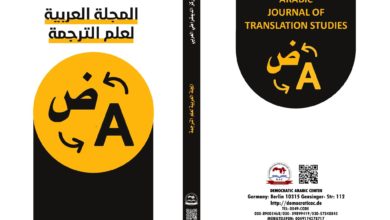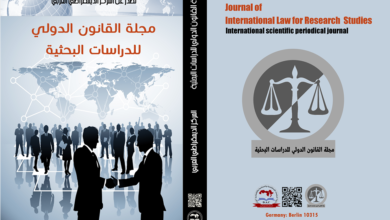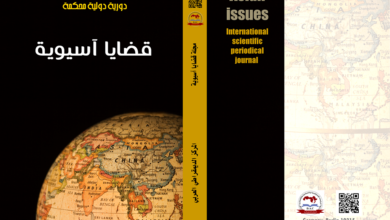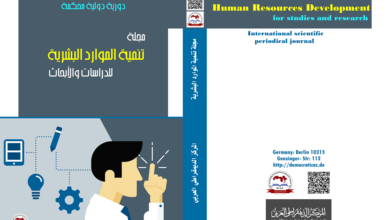إمارة الموصل ودورها السياسي والحضاري – 521-660 هـ – 1127-1261 م
The Emirate of Mosul and its political and civilizational role - 521-660 AH / 1127-1261 AD
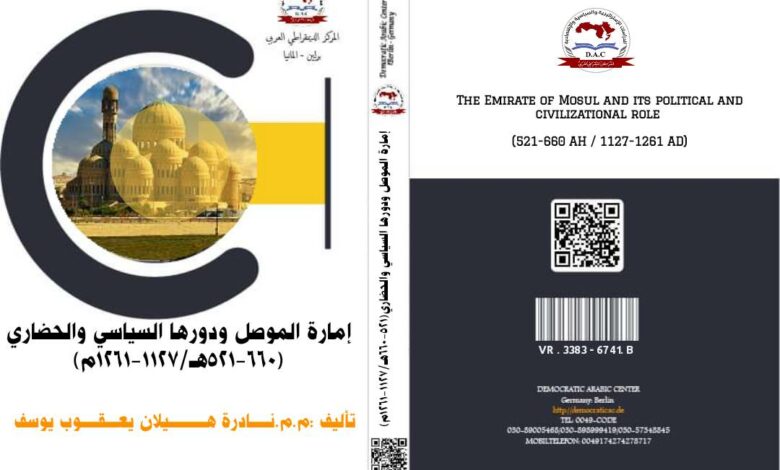
تأليف : م.م.نـــــادرة هــــــــــيلان يعـــقـــــوب يوسف – اشراف : د. اركان طه عبد المشهداني
نسخة “pdf”-
إمارة الموصل ودورها السياسي والحضاري – 521-660 هـ – 1127-1261 م
الطبعة الأولى “2022″ –من كتاب: – إمارة الموصل ودورها السياسي والحضاري – 521-660 هـ/1127-1261 م
جميع حقوق الطبع محفوظة #المركز_الديمقراطي_العربي ولا يسمح بإعادة إصدار هذا الكتاب أو اي جزء منه أو تخزينه في نطاق إستعادة المعلومات أو نقله بأي شكل من الأشكال، دون إذن مسبق خطي من الناشر .
تقديم :
بعد هذه الرحلة الممتعة مع امارة الموصل ودورها السياسي والحضاري(521-660ه/1127-12661م)اوشكت على ركز عصا الرحال, يستقر بي المقام مع ابرز النتائج التي توصلت اليها, فضلا عما تركته مبثوثا اثناء العمل هي ما يأتي:
- لقد توسع ممتلكات اتابكية الموصل على حساب الدول المجاورة لهم فشملت على عدد من اعمال اهمها حران وسنجار ونصيبين وجزيرة ابن عمر وميافارقين .
- كان لدور الجهادي الذي لعبه القائد عماد الدين زنكي مؤسس الاتابكة في الموصل ضد الصلبيين, وإيمانه حتمية وحدة القوى الاسلامية لمواجهة الصلبيين, اثر بارز في تغير في مجرى الاحداث وايقاف الزحف الصليبي ,وقد سار ابنائه بعد وفاته على نهجه في رفع راية الجهاد ضد الصليبين.
- ان الخلافة العباسية منذ سنة(132-660ه/748-1261م)كانت من التسلط القوى الاجنبية المتغلبة على السلطة, والذي اثر سلبا على مراكز اتخاذ القرارات اتجاه ادارة الاقليم ومنها مدينة الموصل.
- اعتمد الخلفاء العباسيون على الامراء والقادة العسكريين الاكفاء لادارة الموصل والذين كانوا يحضون بالقبول لدى سكانها.
- نتيجة الادارة الخاطئة لبعض الخلفاء العباسيون للموصل فقد اسهم ذلك ارباك الاوضاع في المدينة مما ساعد على ظهور حركات المعارضة لسياسة العباسية الموصل.
- اسهمت الادارة المضطربة للخلافة العباسية في ظهور قوى محلية التي اخذت على عاتقها ادارة المدينة بالنيابة عن الخليفة العباسي ومن ثم بداية حكم شبه مستقل عن الخلافة العباسية قادته الاسرة الحمدانية ومن بعدها العقيلية ثم الاتابكة في الموصل.
- في اواخر عهد الخلافة العباسية برز دور الموصل وخاصة في فترة ضعف الخليفة العباسي المستعصم بالله فمال حاكم الموصل الى موالاة المغول على حساب الخليفة العباسي.
- خسرت الدولة الزنكية نفوذها في الشام بعد وفاة الملك العادل نور الدين محمود بن عماد الدين زنكي, واقتصرت نفوذها على مدن الموصل والجزيرة ونصيبين والخابور وحران والرها بعد ان خسرت املاكها في الشام .
- كانت لرغبه صلاح الدين الايوبي ضم الموصل الى املاكه بعد ان نجح في تأسيس سلالة الايوبية لحماية المدن الاسلامية وطرد الصلبيين, إذ كانت محاولاته عديده لاستيلاء على الموصل وضمها الى ممتلكاته لكنها لم تنجح,فقد قام بعده محاولات لذلك من خلال حصارها خلال اعوام(578-581ه/1182-1185م).
- بعد وفاة صلاح الدين الايوبي سنة(589ه/1193م)انقسمت الدولة التي اجهد نفسه في اقامتها ولم شملها الى عدة وحدات ذات استقلال سياسي بين ابنائه واخوته وكبار قادته, فأدى الفراغ السياسي الناجم عن وفاة صلاح الدين الايوبي عدم وجود شخصية قيادية في مستواه الى ضعف الدولة الايوبية واضمحلالها.
- كان حكام الموصل دور فاعل في ازدهار الحياة العلمية من خلال اساليب متنوعة اتبعوها في دعم هذه الحياة والتي من اهمها بناء المساجد والمدارس.
- ازدهرت الحركة العلمية في امارة الموصل في عهد الاتابكة حيث كثرت المدارس التي أنشاؤها فضلا عن ان اغلب علماء الموصل ممن تولوا المناصب كانوا من اسر علمية المشهورة مثل اسرة الشهرزوري واسرة السمناني واسرة الطوسي.
- لقد استعان الاتابكة في ادارة دولتهم بعدد من الموظفين, نخص بالذكر منهم النائب والوزير والوالي والشحنة, كما وزعوا الاعمال الادارية على عدة الدواوين من اهمها ديوان الرسائل و ديوان الجيش وديوان الاشراف وديوان الضرب.
- أثبتت هذه الدراسة تحديدا في الفصل الرابع اهمية مدينة الموصل العلمية ودورها المتميز في تخريج العلماء و الادباء, اذ كانت لا تقل اهمية عن الحواضر العربية الاسلامية الاخرى, وبذلك تعد جهود علمائها مكمله لجهود العلماء العرب المسلمين لانهم اسهموا اسهامآ جادا بتطور الحضارة العربية الاسلامية التي عمت كل الاقطار سواء في المشرق العربي او في مغربه .
Nadirh Hilan Jacob
Professor Dr. Arkan Taha Abdel Mashhadani
Abstract
After this enjoyable journey with the Emirate of Mosul and its political and civilizational role (521-660 AH / 1127-12661AD), the wand almost focused on the wand, the place where the shrine settles with the most prominent results that I have reached, in addition to what I left on display during the work are the following:
1 – The Abbasid caliphate since the year (132-660 AH / 748-12661AD) was from the domination of foreign powers that had conquered the authority, which negatively affected the decision-making centers towards the administration of the region, including the city of Mosul.
2- The Abbasid caliphs relied on the princes and military leaders to abolish the administration of Mosul and those who were accepted by its residents.
3- As a result of the wrong administration of some Abbasid caliphs in Mosul, this contributed to confusing the situation in the city, which helped the emergence of the opposition movements to the Abbasid policy of Mosul.
4- The turbulent administration of the Abbasid Caliphate contributed to the emergence of local forces that took upon themselves to administer the city on behalf of the Abbasid Caliphate, and then the beginning of a semi-independent rule from the Abbasid Caliphate, led by the Hamdanid dynasty, followed by al-Aqiliyya, and then the Tabbakah in Mosul.
5- At the end of the reign of the Abbasid Caliphate, the role of Mosul emerged, especially in the period of weakness of the Abbasid Caliph, as the ruler of Mosul tended to support the Mongols at the expense of the Abbasid Caliph.
6- The Zangid state lost its influence in the Levant after the death of the just king Nur al-Din Mahmoud bin Imad al-Din Zangi, and its influence was confined to the cities of Mosul, Jazira, Nusaybin, Khabur, Harran, and Raha, after it lost its properties in the Levant.
7- Saladin wanted to annex Mosul to his properties after he succeeded in establishing the Ayyubid dynasty to protect the Islamic cities and expel the Crusaders. -581 AH / 1182-1185AD).
8- After the death of Salah al-Din al-Ayyubi in the year (589 AH / 1193 CE), the state, which he put effortlessly to establish, and when he included it, was divided into several units with political independence among his sons, brothers and senior leaders, and the political vacuum resulting from the death of Salah al-Din al-Ayyubi led to the absence of a leading figure at his level.
9- At the expense of the neighboring states of Mosul, Atabekian possessions expanded to include a number of landmarks, the most important of which are Harran, Sinjar, Nusaybin, Ibn Omar Island, and Mayafariqin.
10- The role played by Zangi, founder of the Atabek state in Mosul in the jihad against the Crusaders, and his belief in the inevitability of the unity of Islamic forces to confront the Crusaders, had serious consequences in the course of events after his death. Nour al-Din in most of the loan
11- The Atabekah used a number of employees in the administration of their state, most notably the deputy, minister, governor and shipment, as well as distributed administrative work to several offices, the most important of which are the letters office, the army office, the supervisory office, and the striking office.
12 – The rulers of Mosul had an active role in the flourishing of scientific life through various methods they followed in calling this life, the most important of which was the building of educational institutions such as mosques and schools.
13- The city of Mosul witnessed an era of enlightenment during the era of the Tabukah, as there were many schools established by it.
14- The Mosul sciences, especially the intellectual ones, received the attention of the rulers of Mosul and the encouragement of Mosul scholars and the facilitation of their various scientific activities resulted in the creation of a scientific movement with distinctive characteristics.
15- This study proved specifically in the third chapter the importance of the scientific city of Mosul and its distinguished role in the graduation of scholars and literati, as it was no less important than other Arab Islamic civilizations, and thus the efforts of its scholars are complementary to the efforts of Arab Muslim scholars because they have seriously contributed to the development of the Arab Islamic civilization that Pervaded all countries, whether in the Arab East or in the West.2- The Abbasid caliphs relied on the princes and military leaders to abolish the administration of Mosul and those who were accepted by its residents.
- الناشر: المركز الديمقراطي العربي للدراسات الإستراتيجية والسياسية والاقتصادية


